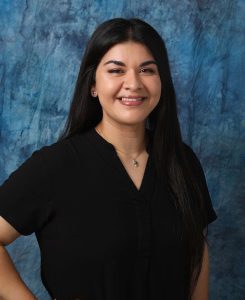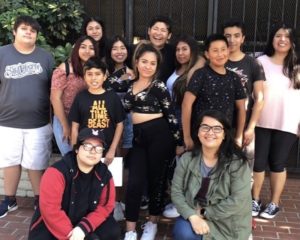Catching Up With Our Intern Alumni
Karen Valladares and Her Journey to Graduate School
By Jed Thompson, CICOES Magazine

A lot has changed for Karen Valladares since she was a CICIOES intern in 2017. “I ended up in graduate school, that’s something I never thought I’d do,” she exclaimed over Zoom in early February, 2022.
Five years earlier, Karen was majoring in chemistry at Mount San Antonio College. She had been there for quite a long time – nearly seven years – and was preparing to transfer to the University of California, Irvine when a professor told her about a research internship offered by CICOES, then known as JISAO, at the University of Washington (UW). She applied, was accepted, and soon flew to Seattle to work with her new mentor, Dr. Casey Saenger, studying tap water samples in a UW isotope lab.
“I constantly look back on my conversations with Casey and the director at the time, Dr. Tom Ackerman,” Karen recalls. “I was sitting in Tom’s office wondering why in the world did I get picked to be an intern? I felt so out of place and so incapable, but Tom and Casey never questioned my ability and never wondered if I was good enough.”
After nine weeks in Seattle, Karen left feeling ready for a new challenge at UC Irvine. “That’s when I started to lean more toward the public policy and how climate change impacts people rather than the planet,” she said. “I started to learn about climate refugees and I’m realizing this is a really big deal.” So, after one quarter at UC Irvine, Karen switched majors from chemistry to public health policy. “I completely stopped taking science classes,” she confessed, “I was so much more concerned about local environmental health issues.”
When Karen learned that Santa Ana, California, a low-income community neighboring Irvine, was dealing with high levels of lead poisoning – an issue that the more affluent Irvine wasn’t facing – she was struck by the staggering difference and inspired to focus her senior year efforts on environmental justice issues. “I worked on a project utilizing PhotoVoice, a research tool used to convey something with pictures rather than words,” Karen explained. The project encouraged a group of young adults and children to go out in their community and take pictures of things in their environment that concerned them. “That’s when I realized that I really liked advocating for communities and allowing people to have a voice,” she said. The project ended up winning UC Irvine’s award for Outstanding Contribution to Public Health, Community and UCI Service.
“I was trying to amplify voices of indigenous people across the watershed”
Around this time, she started attending city council meetings in Santa Ana and found many of them to be quite depressing. “There was a lot going on in Santa Ana,” Karen explained. “The University of Southern California did a study and found that a lot of low-income housing in Los Angeles had been built on old industry areas where the soil was extremely contaminated. How’s that allowed?” she wondered. Karen wanted to understand these issues, so she accepted a fellowship opportunity to implement the ‘Disadvantaged Communities Involvement Program.’ “I was trying to amplify voices of indigenous people across the watershed – everything you see is on stolen land, so I’m trying to acknowledge that while allowing people to express what they feel is wrong with their water.”
A comment at one of the steering committee meetings concerning the Santa Ana Watershed was Karen’s first push to consider graduate school. “They were talking about an emerging class of contaminates knows as PFAS, which are very persistent bioaccumulative chemicals. They were talking like PFAS wasn’t a big deal, and the guy is specifically talking about a low-income area with large minority population,” Karen explained with frustration. “I was really offended by that.” Karen asked the representatives if they would drink the water and they wouldn’t answer. “They just kept saying it’s not a big deal. This is the reason we have health disparities, because people don’t care and they talk about others in this way.”

For the first time in her life Karen was considering graduate school, but suddenly and tragically her older brother passed away during her senior year, a shocking loss that put an end to thoughts of academics. After a long pause to future planning, in January 2020, her professor reached out and said that she knew Karen was really passionate about water issues and wanted to introduce her to another professor at UC Irvine. “I think they were just trying to make sure I didn’t quit because my whole world was destroyed at that time,” Karen said. It turns out this professor, Dr. Scott Bartell, had a grant from the CDC to do work on PFAS; it sounded like a perfect connection, so Karen agreed to the introduction. “I’ll just go talk to them and geek out on stuff,” she thought to herself. “We ended up talking for two hours and at the end of the conversation he said ‘I really want to work with you, would you be willing to start your PhD in the fall?’” Karen was taken aback but enthusiastically agreed.
A short time later, Karen was accepted into UC Irvine’s graduate program, received a prestigious fellowship to help fund her education, and is now studying the health impacts of PFAS and the health disparities that may be exacerbated by the contaminates.
“So here I am in my second year of graduate school working on a PhD in Environmental Health,” Karen says. “I’ve been super lucky. I received a lot of encouragement, first from CICOES and now from my graduate advisor. There have been so many people who have believed in me and that’s really comforting!”
